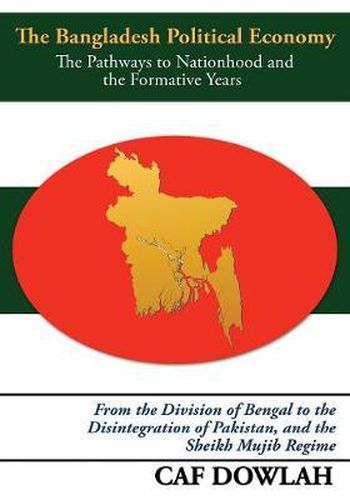Readings Newsletter
Become a Readings Member to make your shopping experience even easier.
Sign in or sign up for free!
You’re not far away from qualifying for FREE standard shipping within Australia
You’ve qualified for FREE standard shipping within Australia
The cart is loading…






This book provides an in-depth scholarly inquiry into evolution of Bangladesh nationhood and the political economy of the formative years of the nation under the Sheikh Mujib Regime (1972-75). The study evolves in the broader context of the historical, ideological, and religious developments that conditioned the partition of British India in 1947, the disintegration of Pakistan in 1971, and the evolution of Bangladesh nation-state since the early twentieth century. The study argues that the ideological and intellectual roots of many of the fiercely debated issues of contemporary Bangladesh can be traced to three major phases in the nation’s tumultuous history: (a) the struggle against external colonialism-in the crosscurrents that underpinned the anti-colonial movements of the Indian Congress and the Indian Muslim League, which eventually led to the partition of British India; and (b) the struggle against internal colonialism-in the discriminatory policies of Pakistani regimes that propelled the emergence of a secular middle class in erstwhile East Pakistan, which not only shattered the foundation of Pakistan’s religion-based nationalism, but also led to the disintegration of the Pakistani-nation itself; and © the post-liberation state formation-when the Mujib regime vacillated between socialist and market-oriented principles in the economic arena and the supremacy of the political party over the nation in the political front.
$9.00 standard shipping within Australia
FREE standard shipping within Australia for orders over $100.00
Express & International shipping calculated at checkout
This book provides an in-depth scholarly inquiry into evolution of Bangladesh nationhood and the political economy of the formative years of the nation under the Sheikh Mujib Regime (1972-75). The study evolves in the broader context of the historical, ideological, and religious developments that conditioned the partition of British India in 1947, the disintegration of Pakistan in 1971, and the evolution of Bangladesh nation-state since the early twentieth century. The study argues that the ideological and intellectual roots of many of the fiercely debated issues of contemporary Bangladesh can be traced to three major phases in the nation’s tumultuous history: (a) the struggle against external colonialism-in the crosscurrents that underpinned the anti-colonial movements of the Indian Congress and the Indian Muslim League, which eventually led to the partition of British India; and (b) the struggle against internal colonialism-in the discriminatory policies of Pakistani regimes that propelled the emergence of a secular middle class in erstwhile East Pakistan, which not only shattered the foundation of Pakistan’s religion-based nationalism, but also led to the disintegration of the Pakistani-nation itself; and © the post-liberation state formation-when the Mujib regime vacillated between socialist and market-oriented principles in the economic arena and the supremacy of the political party over the nation in the political front.